Cop: Jeff Bezos’ WaPo CEO Deceived Police, Framed U.K. Prime Minister

On July 9, one of Jeff Bezos’ two 22-seat Gulfstream G650ERs will deliver him to Sun Valley in Idaho for America’s most concentrated annual gathering of power. On arrival, he is sure to see an old friend: Don Graham, the former publishing magnate and son of Katharine.
Graham sold Bezos the Washington Post, his family’s paper since 1933, for $250m in 2013 in a deal structured at Sun Valley. “I do not know a finer man,” Bezos said of him at the time. He was full of optimism: Graham had sold him on the idea that he could change journalism. But after some initial success, Bezos now owns a paper that lost $77m last year. Its audience has halved since the “Trump bump” of the late 2010s. And Will Lewis, the British CEO to whom he turned to jump-start his title, has become the subject of a reporting frenzy.

William Lewis is the embattled CEO of the Washington Post, but new reporting reveals major allegations about conduct as Rupert Murdoch's aide.
Now new revelations are severely challenging Lewis’ account of his past, and bringing into question how much Bezos could have known about the man he hoped would fix the Post.
The Daily Beast is for the first time reporting in depth the opinion of police officers who questioned Lewis while he was working for Rupert Murdoch in the early 2010s. One of those officers, who asked for anonymity due to active civil lawsuits, thinks that Lewis and another executive told police “a total fabrication” in 2011 as part of a corporate cover-up to spare Murdoch and his executives.
“It was a poppycock story about why they had deleted millions of emails. We challenged it and asked for evidence for weeks afterwards. It never came. They’d made it up.”
Scotland Yard detectives questioned Lewis in July 2011, at the peak of an investigation into illegal phone hacking at Murdoch’s British tabloids, specifically the News of the World. Police wanted to know why 30 million emails had been deleted since Lewis’ arrival at News International, Murdoch’s U.K. news company. Some 26 million emails had been deleted after police explicitly instructed News International to send them “any material which could be potential evidence of phone hacking.” The emails included those of Murdoch’s son James and Rebekah Brooks, the company’s two lead executives.

Rebekah Brooks was the CEO of News International and reported directly to Rupert Murdoch. Her emails were deleted as part of the purge.
In an implausible twist, Lewis told detectives that the emails had indeed been deleted, but for good reason: in order to foil a plot to steal Brooks’ emails orchestrated by Gordon Brown, Britain’s Labour prime minister from 2007 to 2010. That sensational allegation, which none of the police officers believed when they heard it, was only made public last month.
Brown was equally astounded. He reacted by writing to Sir Mark Rowley, the head of Scotland Yard, to demand a new criminal investigation into “the destruction of evidence” by News International and “the cover up that followed”. He has described Lewis’ story as “completely untrue… shocking and disturbing”, and argued that it “undermines the company’s previous public defence that emails were destroyed as a matter of routine.” Lewis’ allegation about Brown, and Brown’s reaction to it, had gone unreported in the US until this week.
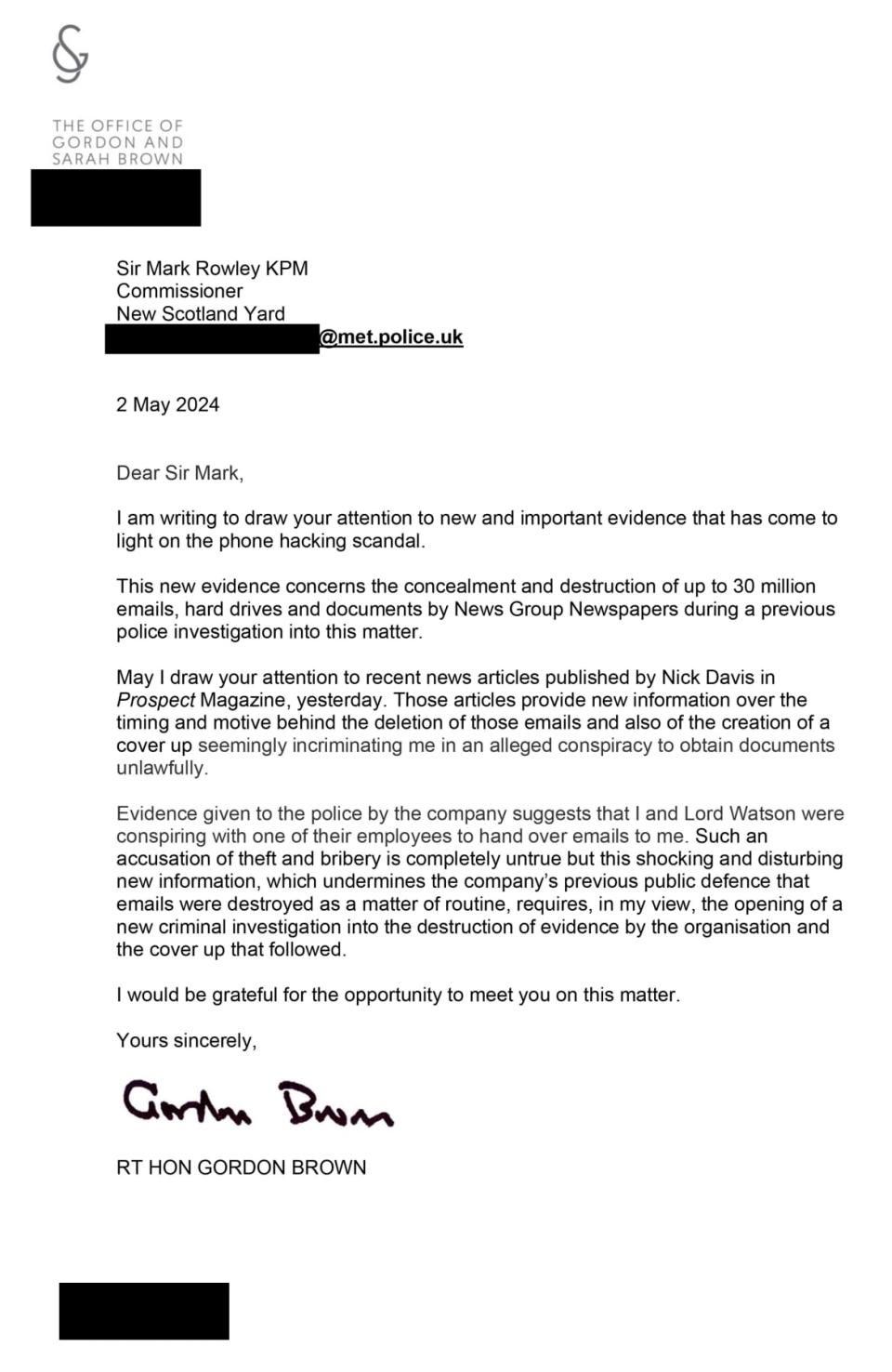
This is the letter Gordon Brown, the former British prime minister, wrote to London's most senior police officer, requesting a criminal investigation into News Corporation's conduct.
“If someone is deleting emails [relevant to an ongoing police investigation],” the police officer told the Beast, “they are perverting the course of justice.”
An Emerging Story
Lewis has sought to suppress coverage, at the Post and elsewhere, of what he did for Murdoch.
The allegations that he oversaw mass email deletions at News International first surfaced in May 2020, when he was shortlisted to be the BBC’s next director general, one of the most prestigious jobs the British establishment can offer; Lewis did not get the role. The claims threatened to derail his candidacy, or bedevil him if he had won the position. He vociferously denied them at the time, saying: “The allegation that I was involved in any wrongdoing is completely untrue. My role was to put things right, and that is what I did.” (Right for whom? Lewis didn’t say.)
The claims were made as part of a civil lawsuit brought against Murdoch’s tabloids in London by Prince Harry and dozens of other phone hacking victims. The case continues to bring new facts to light, year after year, as Harry’s lawyers have been able to depose more than 200 people and force the disclosure of some News International records.
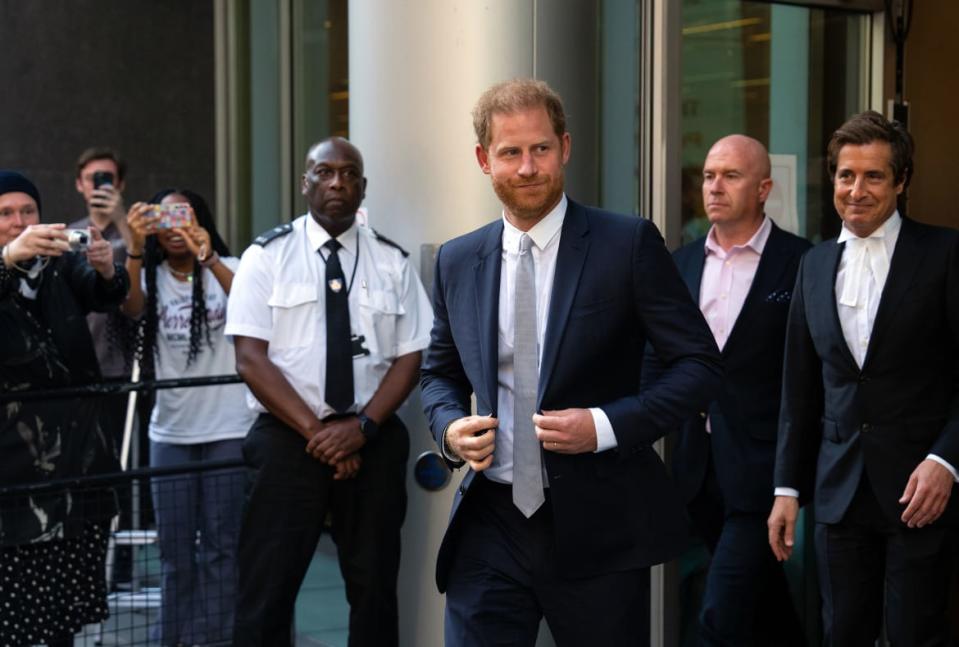
Prince Harry is suing News Corporation alleging it covered up phone hacking by Rupert Murdoch's journalists. Documents from his case have revealed Lewis' alleged involvement.
What did Bezos know about the case? What was he told by Patty Stonesifer, his trusted D.C. adviser and Amazon’s longest-serving board member, or by Erik Sorenson, the head-hunter whose firm Sucherman vetted Lewis? When Lewis was hired in November, Stonesifer said of him: “Bold leadership was part of what we were actually looking for. And believe me, we did our homework to determine whether that leadership went too far.”
The New York Times reported this month that Stonesifer had reviewed the allegations. She “came away satisfied with his [Lewis’] explanation,” a person “familiar with the matter” told the Times.
News Corporation has repeatedly denied any wrongdoing in court, including on Lewis’ behalf. Last December, after Lewis’ appointment was announced, it directed reporters to a 2015 decision by British prosecutors not to charge any of Murdoch’s executives with destroying evidence. News Corp told the Times on Monday that the allegations were “illogical, far-fetched and inherently incredible.” In response to The Daily Beast, the Washington Post issued a statement attributed to Lewis: “Any allegations of wrongdoing are untrue. I have no further comment to make.”
Addressing the Post staff by email from his 417-foot sailing yacht as it cruised the Greek islands, Bezos promised that “the journalistic standards and ethics at the Post will not change” while Lewis is CEO. The paper’s central mission has been to hold power to account since it broke the Watergate scandal 52 years ago. Bezos upheld that mission after he bought the Post by backing a beloved executive editor in Marty Baron, who took on the Catholic Church, revealing its cover up of child sexual abuse. Bezos also gave the Post free rein to report on his company, Amazon.
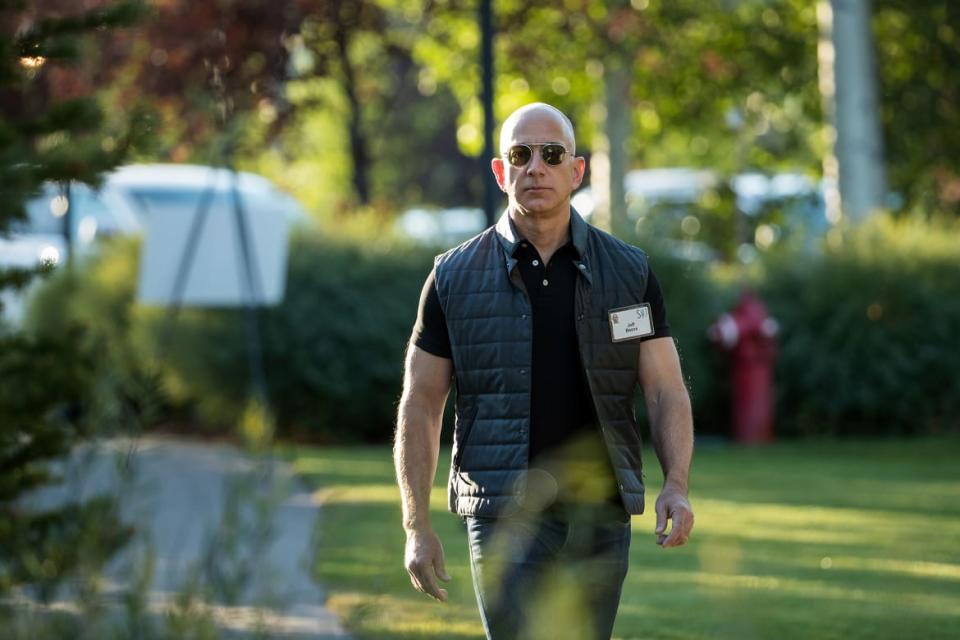
Jeff Bezos, seen at the Allen & Company Sun Valley Conference in 2017, will return there in July, while he faces a roiling crisis over his ownership of the Washington Post.
Now he has empowered a chief executive who is declining to answer questions about his past, whether that’s “right or wrong,” as Lewis has said. What did he do that he won’t discuss?
The Scale of Destruction
Lewis’s fateful meeting with the police took place in July 2011. He had by then spent 10 months “cleaning up the phone hacking mess” for Rupert Murdoch, as a friend of his puts it.
Lewis had nothing to do with hacking when it was rife at Murdoch’s tabloids from 1994 to 2009. He was an ascendant journalist elsewhere, breaking major business stories in the Financial Times in New York and Sunday Times in London. In 2010 he was anointed journalist of the year by his peers after the paper he edited, the Daily Telegraph, ran a vast exposé of British MPs’ expenses. (It documented widespread abuse by Britain’s political class: one MP claimed for an ornamental floating duck island, another charged the taxpayer to clean the moat of his castle.)
But Lewis’ ambitions exceeded the editor’s chair. Fascinated by power, he persuaded the Telegraph’s billionaire owners to send him on an eight-week crash course at Harvard Business School. He returned to London determined to remake himself as an entrepreneur, convincing his bosses to let him spin-off a new digital company while retaining the editorship. The venture, known as the “Euston Project,” soon lost £3m. Lewis lost his job, and his perch atop London media.
Murdoch swooped, offering him the chance to join News International as its group general manager. Lewis segued into the executive career he wanted, fast becoming Murdoch’s point man on the hacking fallout. He served as the link between the police and News International.
Now, in July 2011, the officers in front of him had an urgent question: Why had millions of company emails been deleted since Lewis arrived at News International the previous September?
In January that year, News International had been expressly instructed by police to preserve any evidence it held relevant to the crimes its journalists might have committed. The company had already been asked to do so, first in September 2010—in the week Lewis joined—by lawyers acting for Sienna Miller, who was suing them for hacking her phone. (Murdoch has since spent $1.5bn settling hacking cases: twice as much as he spent settling the Fox-Dominion case.)
Despite those instructions, 30 million emails had been destroyed during Lewis’ tenure. They had been deleted in three great waves: in September 2010, days after Miller’s lawyers sent their request (when 4.4m emails were deleted); in January 2011, the month the police requested evidence of phone hacking be kept (when 11m were deleted); and again in February, after the police investigation into News International had begun (when a further 15m were wiped).
The police had only begun to realize the scale of destruction in May when Nigel Newell, an IT contractor paid by the company, revealed in a witness statement what he had been asked to do. At one point Newell had refused to delete emails, passing on instructions rather than deleting them himself. The IT contractors, says the police officer who spoke to the Beast, were “very uncomfortable with what was going on there.”
An Unbelievable Plot
Lewis met police on Friday, July 8, 2011. The meeting, which took place at News International, was recorded in police notes taken by one of the officers. Lewis sat across from Detective Inspector Barney Ratcliffe, Detective Sergeant Wayne Harknett, and a third officer.
He sat beside Paul Cheesbrough, News International’s chief information officer, who had worked for Lewis on the Euston Project. The pair proceeded to justify the company’s mass deletion of emails by telling detectives a story they found fanciful, if not completely unbelievable.
Lewis told the officers that he and Cheesbrough had, in January, discovered a plot to steal the emails of Rebekah Brooks, the company’s CEO. But this was no ordinary plot. It was—he claimed, staggeringly—a conspiracy orchestrated by Gordon Brown, who had only stood down as the U.K.’s Labor prime minister the previous year, and who was famous for his probity.

Gordon Brown was the U.K.'s Prime Minister from 2007-2010. Now he is demanding a criminal investigation into how Lewis alleged he was plotting to steal News International's emails.
Brown had been the U.K.’s Chancellor of the Exchequer (the U.K.’s equivalent to Treasury Secretary) for a decade before he became PM in 2007. He had also been a source of Lewis’ in the early 1990s, when Lewis was a cub reporter at the Mail on Sunday. Lewis’ older brother, Simon, had been Brown’s director of communications as PM. If anyone was in a position to know of Gordon Brown’s dour but upstanding character, it was Will Lewis.
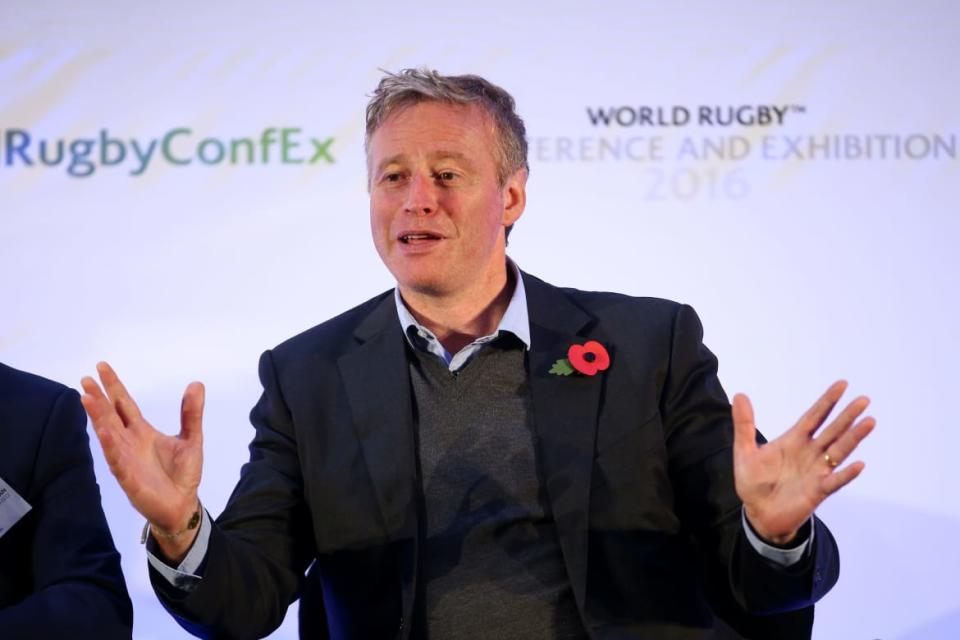
Simon Greenberg was Lewis' right-hand man who sent an email saying "Ta, let the game begin" about the claim that Prime Minister Brown was plotting to steal millions of emails.
Nevertheless, Lewis alleged to police officers that Brown was conspiring with Tom Watson, the Labour MP who had become Murdoch’s most vocal critic in parliament over hacking. Lewis went on to claim a source had warned them that a member of News International’s IT staff had accessed Brooks’ emails and passed them to Watson.

Lewis' story to police was that Tom Watson, then a Labour MP, was orchestrating the theft of Rebecca Brooks' emails. But, a police officer called that claim "poppycock."
The purported plan, Lewis and Cheesbrough alleged, was to steal more than a decade’s worth of Brooks’ data and sell it on to Watson, according to a summary of the meeting in court documents. Lewis claimed to detectives that these emails would then be handed to Brown. He offered no rationale for why Brown might want them.
The allegations were extraordinary. They finally came to light in the U.K. last month, after being reported in depth by Nick Davies in Prospect Magazine. Brown, learning of them for the first time, was incredulous in a TV interview with ITV, and sent his request for a new investigation to the commissioner of London’s Metropolitan Police on May 2. He has not yet received a reply.
One of the officers who heard Lewis and Cheesbrough outline the alleged plot told The Daily Beast: “We got evidence from Nigel Newell [the IT contractor], that in January and February 2011, News International were still deleting millions of emails. They said it [the deletions] had to be done quickly because Gordon Brown and Tom Watson were trying to get data through an employee or ex-employee of News International.”
But if only Brooks’ emails were at risk of being stolen, why had tens of millions of other emails also been deleted? Brooks’ emails were not—in any case—kept on the company database from which so many emails had been removed; they were stored separately. And why, if Lewis had evidence of so stunning a plot, did the man who had made his name by publishing the MPs’ expenses scandal not break this front-page news?
Why, the detectives persisted, hadn’t News International confronted Watson? Police records show that Lewis said the company did not want to be accused of bullying him.
“However hard we pressed, that story was never expanded on or substantiated,” says the officer. “There was never any credence to it.”
‘Fight to the Last Man’
The July 8 meeting was the first time Lewis or News International admitted to police that any of the company’s emails had been destroyed. Lewis and Cheesbrough had not mentioned the supposed security threat to police when they claimed to have discovered it in January that year. When they finally told detectives about it on July 8, they deployed it as an excuse for their actions.
What had been lost? Every email sent or received by any of News International’s employees before 2008 had been deleted. Emails from before 2005 were deleted shortly after Lewis’ arrival in September (a corporate desire to delete emails “unhelpful in the context of future litigation,” as one executive put it, predated Lewis; James Murdoch and Rebekah Brooks had been discussing email deletion for almost a year by then).
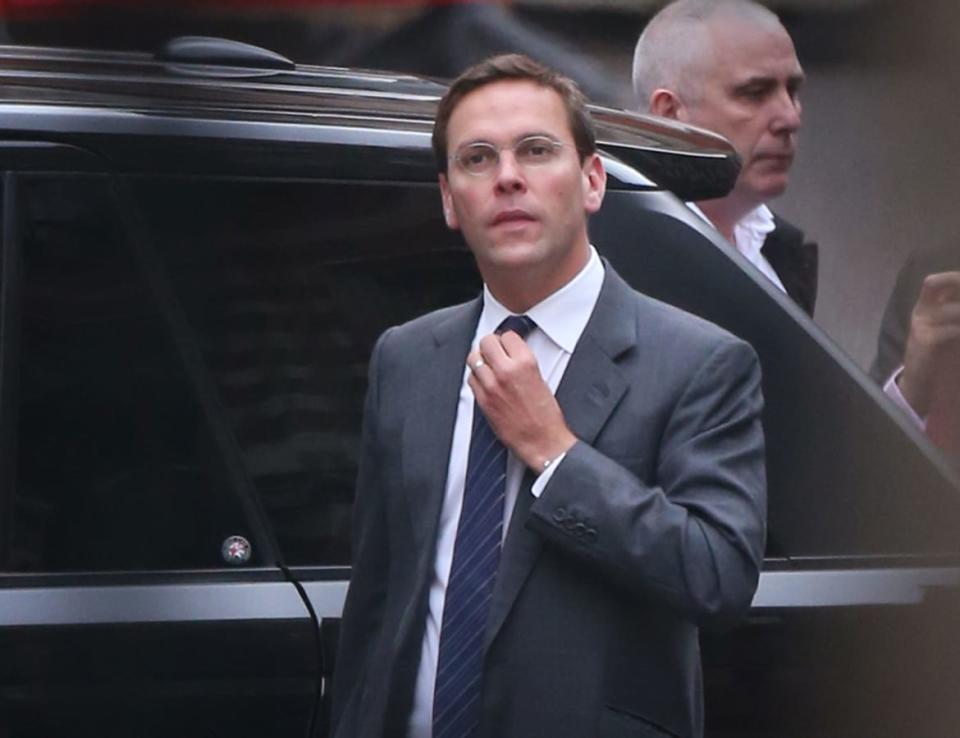
Rupert's Murdoch's son, James Murdoch, had discussed email deletion for a year before Lewis arrived. His own emails were erased during the mass deletions.
Every email from between 2005 and 2007—a crucial period when Murdoch’s tabloids were first investigated for hacking–were deleted in haste between Jan. 14 and Feb. 9, 2011, as the police’s new investigation into hacking, Operation Weeting, was set up. A series of emails show the role Lewis played during this rapid “email migration”, as he put it in a message he sent on Feb. 3.
Now Lewis and Cheesbrough were telling police that a conspiracy to steal company data, orchestrated by a former prime minister, justified all of this destruction. The threat of theft had in fact spurred them to go further, according to court documents. In addition to the mass deletions of emails before 2008, they had also deleted every email sent or received by senior company executives during 2008, including those of Murdoch’s son, James, then executive chairman of News International.
Three Strikes So Why Is WaPo CEO Will Lewis Not Out?
Lawyers acting for Murdoch’s tabloids have admitted that “from January 14 some emails of some Senior Executives were deleted.” They have “denied because it is not true that ‘targeted deletions’ took place.”
The police were frustrated throughout 2011 in their efforts to access News International’s data. “We didn’t get into their IT system for weeks on end, while they were busy cleaning the system,” says the officer who spoke to The Daily Beast. “Our operation [Weeting] started in January but we didn’t have control of what they were doing for a lot longer than that.”When the police first met with News International on Feb. 9, to discuss the state of the company’s email archive, “we were escorted in and out of the building,” says the officer. “Security staff at the gate that day said they had been told to fight to the last man if we tried coming in with warrants.” The police did not turn the offices of News of the World into a crime scene for another five months.
“Ta, let the game begin”
Lewis and Cheesbrough did offer the police one trail of evidence for their alleged conspiracy: an internal email chain. This, they claimed, proved their suspicions. It went back to January 2011, six months earlier.
Cheesbrough had sent Brooks an email on Jan. 24, copying in Lewis and alerting her to a suspected theft. A few weeks later, on Feb. 11 Cheesbrough emailed a cybersecurity firm, Stroz, again copying in Lewis. He requested that Stroz conduct an investigation into “a potential theft of data from News International.” Cheesbrough wrote that “an employee was offering significant amounts of News International email data to an MP due to political allegiances.”
But there was a problem with Lewis and Cheesbrough’s story. It was lying in wait on the email chain they were citing. The police had no knowledge of it at the time.
Billionaires, Secrets, Zegnas: Will Lewis’ Thirst for Power
Cheesbrough had forwarded the email on to another News International executive, Simon Greenberg, a former sports journalist and friend of Lewis’ whom he had helped recruit to the company in January 2011. Lewis liked to work with people he trusted. The trio were operating as one team under him.
A police investigation was underway. The company was facing a flood of civil lawsuits. Thirty million emails had gone missing. And Lewis and Cheesbrough were claiming that a conspiracy to steal company data, run in some way by Gordon Brown, explained everything. It was an astonishing accusation.
Yet Greenberg wasn’t astonished. Instead he sent back a laconic reply: “Ta [thank you], let the game begin.”
Lawyers for Murdoch’s tabloids admit these emails were sent. They say Cheesbrough’s email on Jan. 24 was the “first of two occasions on which NGN”—News Group Newspapers, the division of News International in which Murdoch’s tabloids were housed—“received information that a current or former employee was, or was attempting to, leak NGN’s email data.”
Murdoch’s lawyers have argued that “the security threats were believed to be genuine and were not devised as part of an alleged ‘cover-up’.” They are yet to respond to Greenberg’s “let the game begin” email, referring to it only as “inappropriately pleaded evidence”—accepting its accuracy but ignoring its meaning. They say they will respond to it “at trial if necessary”.
Prince Harry’s lawyers have argued that Greenberg’s email “revealed the artifice” of Lewis and Cheesbrough’s purported plot. An Operation Weeting officer, who was unaware of the email in 2011, agrees with that assessment.
As part of their case, Harry’s lawyers have cited a witness statement from the officer who ran Operation Weeting, Detective Superintendent Mark Ponting. They describe Ponting as becoming “concerned about attempts to pervert the course of justice” in April after News International handed over just 54 emails to police in three months. Those suspicions were strengthened in May when Nigel Newell, the IT contractor, told police what he had seen.
The Daily Beast spoke to Ponting, who is now retired. He declined to comment on specifics, but he said this: “I am confident that in time the civil cases will bring out the truth.”
Greenberg cannot testify. He died in August 2021, aged 52, of complications from Creutzfeldt-Jakob disease. At the time of his death, Lewis was described as “his best friend.”
The Great Deletion
On Monday Jan. 24, 2011, Rupert Murdoch flew to London to take charge of the spiraling phone hacking story. Rebekah Brooks, News International’s CEO, wrote in an email to a friend that day: “Will and Simon,” referring to Lewis and Greenberg, “will present a plan to the boss this week on our strategy.”
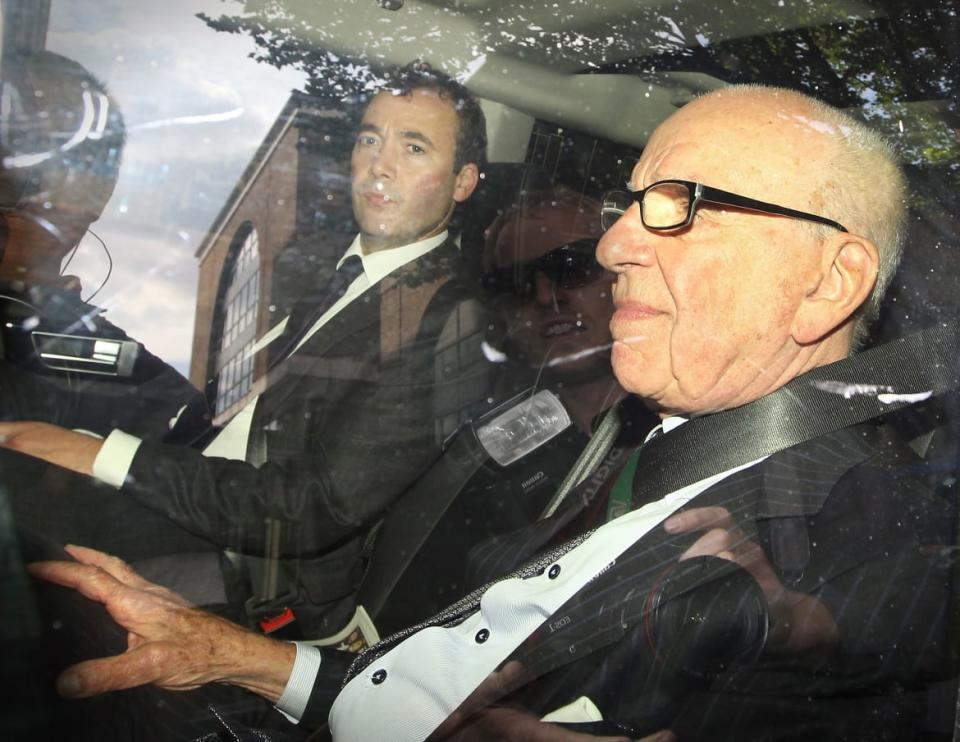
Days after the police interview, in which outlined his extraordinary claims about Gordon Brown, he was side by side with Rupert Murdoch.
Lewis was at the center of events, working directly for the most powerful man in British media.
What was he doing? Eighteen days earlier, on Jan. 6, News International had discovered three internal emails that incriminated journalists at News of the World. The next day they were sent the police instruction, from Detective Superintendent Dean Haydon, to preserve “any material which could be potential evidence of phone hacking.” Lewis met with Brooks and others that afternoon for two hours. They then failed to pass over the emails they had found to the police for almost three weeks.

The last edition of Rupert Murdoch's News of the World, which he closed in the wake of the phone hacking scandal. Lewis was in charge of the response to the fallout.
By the time Lewis met with Murdoch on Jan. 24, the company was almost ready to hand over the emails. They knew doing so would precipitate a police investigation. In preparation, Lewis had for the past two weeks overseen the mass migration—and deletion—of the company’s emails. He had personally drawn up the criteria for how the migration should be handled. NGN’s lawyers say his sole aim was the “preservation of data.”
But the reaction of an IT contractor told to carry out Lewis’ plan suggests the opposite was true.
How do you delete millions of emails while apparently preserving data? Lewis’ instructions in mid-January reveal the process. The mailboxes of certain users—referred to in the Times as the “Will Lewis’ list”—were specified for preservation and migrated onto a new system via a laptop. Everyone else’s mailboxes were then deleted. Senior executives were not on the list of users to be saved. Lewis’ instructions preserved a thimbleful of data while deleting several truckloads.
This is when Nigel Newell, the IT technician contracted by News International to run the migration, declined to act. An employee in Paul Cheesbrough’s team had to delete the emails instead. That employee was then told to destroy any back-up tapes “so that there were none available to be physically stolen.”
None of this has been contested by NGN’s lawyers, but they say “emails were deleted for commercial, IT and practical reasons”. They have contested that executives took “active steps to delete millions of emails which were ‘potentially incriminating’.” (News Corp reiterated this stance to the Times on Monday, saying that Lewis and other executives had “acted throughout with the utmost integrity” and “strongly” denying allegations that the deletions were to conceal evidence rather than to create storage space, as they claim.)
But if Lewis’ intention was to preserve any and all relevant data, why did Newell rebel?
On Jan. 26 2011, News International handed over the three incriminating internal emails and Operation Weeting began. There was a brief pause on further deletions, which Newell described in an email on Jan. 31 as “coming from the top.” There were three options, he wrote, his concern evident. “Continue with clean up plan; stop clean plan where it is and leave as is; [or] restore all archives already deleted (!!)”
Billionaires, Secrets, Zegnas: Will Lewis’ Thirst for Power
The pause did not last. On Feb. 3 Lewis emailed Cheesbrough to pass on a “green light.” The “email migration process”, Lewis wrote, should continue. Over the next six days, 15 million emails were deleted, following the 11 million deleted in January (and 4 million the previous September.)
On Feb. 9 News International met with the police for the first time. This is when officers were, according to one present, “escorted in and out of the building”. Having sat down, the police were told that the company held no data prior to 2008. They were not told that three years worth of emails—everything from 2005 to 2007—had just been deleted in 25 days.
“At some point they knew the pressure was on to open up and show us things and let us in,” says the police officer who spoke to the Beast. “I think they thought they had swept things clean to protect James [Murdoch] and Rebekah [Brooks] and a couple of other people before letting us in. They knew the game was up for other junior members of the staff. But I think they did their utmost to ensure that things were cleaned up before we got there.”
The Paper of Bernstein and Lewis
In September 2011, shortly after Lewis’ fateful meeting with the police, Carl Bernstein likened the phone hacking scandal to Watergate at an event in London. Both, said the reporter who broke that story with Bob Woodward, were “shattering cultural moments… about corruption at the highest levels.” Bernstein was referring to hacking itself rather than any subsequent cover-up, which had not been alleged at the time.
When Lewis joined the Post late last year he said, “The WaPo is the thing. It’s the thing I grew up on. I was schooled on Watergate, the Pentagon Papers.” He had been 1 when the Pentagon Papers were published; 3 when the Watergate burglary occurred and 7 when All The President’s Men was released.
Three Strikes So Why Is WaPo CEO Will Lewis Not Out?
Bezos too was a student of the Post’s storied past. After his purchase of the paper in 2013 he committed to uphold the ethos of Katharine Graham, who, along with her editor Ben Bradlee, had the courage to run the stories cited by Lewis. Bezos pledged that the Post would pursue the truth “no matter the cost.”
Lewis has echoed those ideals. On March 9 he wrote, in a weekly corporate newsletter he sends independently of the Post: “Independent journalism is underfunded and under siege… [it] involves writing, reporting, and publishing facts that you may not like—regardless of who you offend.”
The court case in which he is named is now heading for trial in London in January 2025. He is described as being “integral” to a cover-up. The case may be settled before then. But how long can Lewis endure the accusations levied in it while running the paper of Graham and Bradlee, Woodward and Bernstein? For how long can Jeff Bezos let him?
Get the Daily Beast's biggest scoops and scandals delivered right to your inbox. Sign up now.
Stay informed and gain unlimited access to the Daily Beast's unmatched reporting. Subscribe now.

 Yahoo News
Yahoo News 
